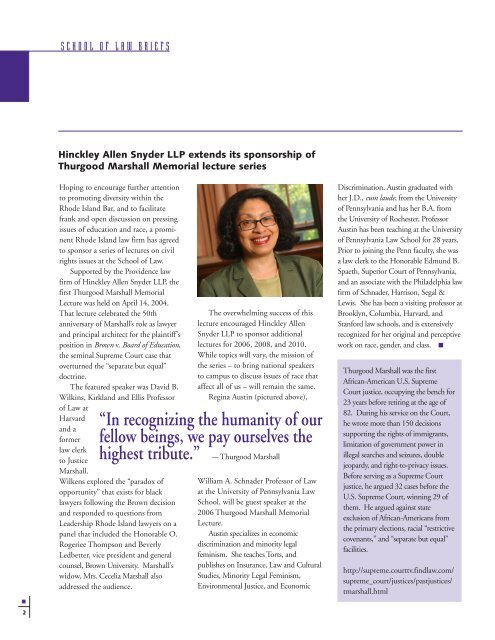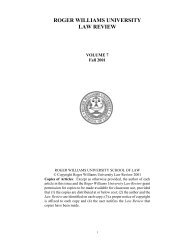AMICUS Vol. 4, No. 2 (Fall 2005) - Roger Williams University School ...
AMICUS Vol. 4, No. 2 (Fall 2005) - Roger Williams University School ...
AMICUS Vol. 4, No. 2 (Fall 2005) - Roger Williams University School ...
Create successful ePaper yourself
Turn your PDF publications into a flip-book with our unique Google optimized e-Paper software.
SCHOOL OF LAW BRIEFS<br />
Hinckley Allen Snyder LLP extends its sponsorship of<br />
Thurgood Marshall Memorial lecture series<br />
Hoping to encourage further attention<br />
to promoting diversity within the<br />
Rhode Island Bar, and to facilitate<br />
frank and open discussion on pressing<br />
issues of education and race, a prominent<br />
Rhode Island law firm has agreed<br />
to sponsor a series of lectures on civil<br />
rights issues at the <strong>School</strong> of Law.<br />
Supported by the Providence law<br />
firm of Hinckley Allen Snyder LLP, the<br />
first Thurgood Marshall Memorial<br />
Lecture was held on April 14, 2004.<br />
That lecture celebrated the 50th<br />
anniversary of Marshall’s role as lawyer<br />
and principal architect for the plaintiff’s<br />
position in Brown v. Board of Education,<br />
the seminal Supreme Court case that<br />
overturned the “separate but equal”<br />
doctrine.<br />
The featured speaker was David B.<br />
Wilkins, Kirkland and Ellis Professor<br />
of Law at<br />
“In recognizing the humanity of our<br />
fellow beings, we pay ourselves the<br />
highest tribute.” — Thurgood Marshall<br />
Harvard<br />
and a<br />
former<br />
law clerk<br />
to Justice<br />
Marshall.<br />
Wilkens explored the “paradox of<br />
opportunity” that exists for black<br />
lawyers following the Brown decision<br />
and responded to questions from<br />
Leadership Rhode Island lawyers on a<br />
panel that included the Honorable O.<br />
<strong>Roger</strong>iee Thompson and Beverly<br />
Ledbetter, vice president and general<br />
counsel, Brown <strong>University</strong>. Marshall’s<br />
widow, Mrs. Cecelia Marshall also<br />
addressed the audience.<br />
The overwhelming success of this<br />
lecture encouraged Hinckley Allen<br />
Snyder LLP to sponsor additional<br />
lectures for 2006, 2008, and 2010.<br />
While topics will vary, the mission of<br />
the series – to bring national speakers<br />
to campus to discuss issues of race that<br />
affect all of us – will remain the same.<br />
Regina Austin (pictured above),<br />
William A. Schnader Professor of Law<br />
at the <strong>University</strong> of Pennsylvania Law<br />
<strong>School</strong>, will be guest speaker at the<br />
2006 Thurgood Marshall Memorial<br />
Lecture.<br />
Austin specializes in economic<br />
discrimination and minority legal<br />
feminism. She teaches Torts, and<br />
publishes on Insurance, Law and Cultural<br />
Studies, Minority Legal Feminism,<br />
Environmental Justice, and Economic<br />
Discrimination. Austin graduated with<br />
her J.D., cum laude, from the <strong>University</strong><br />
of Pennsylvania and has her B.A. from<br />
the <strong>University</strong> of Rochester. Professor<br />
Austin has been teaching at the <strong>University</strong><br />
of Pennsylvania Law <strong>School</strong> for 28 years.<br />
Prior to joining the Penn faculty, she was<br />
a law clerk to the Honorable Edmund B.<br />
Spaeth, Superior Court of Pennsylvania,<br />
and an associate with the Philadelphia law<br />
firm of Schnader, Harrison, Segal &<br />
Lewis. She has been a visiting professor at<br />
Brooklyn, Columbia, Harvard, and<br />
Stanford law schools, and is extensively<br />
recognized for her original and perceptive<br />
work on race, gender, and class. ■<br />
Thurgood Marshall was the first<br />
African-American U.S. Supreme<br />
Court justice, occupying the bench for<br />
23 years before retiring at the age of<br />
82. During his service on the Court,<br />
he wrote more than 150 decisions<br />
supporting the rights of immigrants,<br />
limitation of government power in<br />
illegal searches and seizures, double<br />
jeopardy, and right-to-privacy issues.<br />
Before serving as a Supreme Court<br />
justice, he argued 32 cases before the<br />
U.S. Supreme Court, winning 29 of<br />
them. He argued against state<br />
exclusion of African-Americans from<br />
the primary elections, racial “restrictive<br />
covenants,” and “separate but equal”<br />
facilities.<br />
http://supreme.courttv.findlaw.com/<br />
supreme_court/justices/pastjustices/<br />
tmarshall.html<br />
2

















